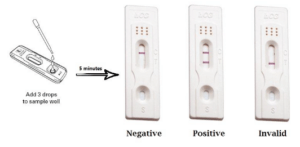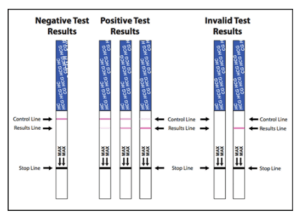Share this blog post with your friends
Let us discuss something exciting: pregnancy testing! These little sticks have the potential to validate one of life’s most stunning miracles: pregnancy. Whether you’re actively trying to conceive or believe you’re pregnant, it’s critical to understand the complexities of interpreting pregnancy test results. In this context, we’ll explore the complexities of several pregnancy tests and the development of their findings over time.
We’ll teach you how to correctly comprehend and interpret pregnancy test results, from the barely noticeable lines that make you squint to the clear positives that fill your heart with delight. Prepare to go on an illuminating trip as we interpret the language of pregnancy tests.
How Pregnancy Tests Work and Types of Tests
Pregnancy tests rely on detecting the hormone human chorionic gonadotropin (hCG) in urine or blood. When a woman is pregnant, her body creates hCG, which specialist antibodies in the test can detect. These antibodies attach to hCG and cause a response, indicating a positive result. Understanding the science underlying pregnancy tests aids in obtaining accurate and dependable results. For the most reliable confirmation of pregnancy, a test should be taken following a missing period or as advised.
Types of Tests
We’ll go through the most popular forms of pregnancy testing, such as urine and blood tests:
Urine Tests: These are tests that may be performed at home by urinating on a stick. They test your urine for the presence of hCG hormone and provide you with immediate findings. They’re simple to use, inexpensive, and can be done in the comfort of your own home. They may not, however, be as sensitive in detecting extremely early pregnancies.

Source: Laboratorytest.org
Blood Tests: These tests are done at a healthcare facility. They identify pregnancy sooner than urine tests by measuring the amount of hCG in your blood. They’re more precise and can even tell you how much hCG is in your system. They are, however, more expensive and necessitate a visit to the doctor’s office.
Early Pregnancy Test Results
The notion of early detection offers considerable advantages when it comes to pregnancy testing. Early pregnancy tests can identify pregnancy in the early stages, even before missing menstruation. This prompt confirmation provides various advantages, including early access to prenatal care and the capacity to make educated health and well-being decisions.
One of the key factors that contribute to early detection is the sensitivity level of the pregnancy test. Early pregnancy tests are made to be very sensitive, detecting even low amounts of the pregnancy hormone hCG (human chorionic gonadotropin) in the body. Because of its great sensitivity, correct results can be obtained as early as a few days before a missed period.
Interpreting Pregnancy Test Lines
When you take a pregnancy test, it’s crucial to understand the difference between the control line and the test line. The control line always appears to ensure that the test is running properly. The test line, on the other hand, reveals whether or not you are pregnant.
Let us now discuss how to understand various scenarios. On occasion, you may notice faint lines on the test. Even if they aren’t particularly dark, they might indicate pregnancy. However, it’s wise to double-check with another test to be sure. Remember that evaporation lines, which may appear after the specified period, are not reliable markers of pregnancy. If you receive an ambiguous or confusing result, you should repeat the test to obtain correct results. For the best interpretation, remember to follow the instructions that came with the test kit.

Source:Shopee Malaysia
Factors Affecting Pregnancy Test Results
Several factors can influence the accuracy of pregnancy test results. Certain medications, like fertility drugs or hormonal therapies, may impact the outcome. It’s important to talk to your doctor about any medications you’re taking and how they might affect the process.
Fertility therapies such as IVF or specific injections might potentially have an impact on pregnancy test accuracy. These therapies include the hormone hCG, which is detected by pregnancy tests. To achieve reliable results, make sure to follow your doctor’s instructions on when and how to go about the process.
Some medical conditions, like ectopic pregnancy or specific ovarian cysts, can interfere with pregnancy test outcomes too. If you have any known medical conditions, it’s essential to discuss with your doctor how they might affect the results.
To ensure reliable and accurate results, here are a few tips:
- Carefully read and follow the instructions provided with the pregnancy test.
- Take the test in the morning when hCG levels are typically higher in the first urine of the day.
- Set a timer to track the specified waiting time for the results.
- Check the expiration date and store the test kit properly.
- Avoid excessive fluid intake before taking the test to prevent urine dilution.
- If you get a negative result but still suspect pregnancy, wait a few days and take the test again to allow for a possible increase in hCG levels.
Note that: if you have any concerns about the accuracy of your test results, it’s always best to reach out to your doctor for further guidance and support.
Conclusion
By understanding the progression of pregnancy test results and taking appropriate measures, individuals can confidently embark on their journey towards parenthood. Remember, knowledge is power, and seeking professional advice is always encouraged for personalized care and support.

